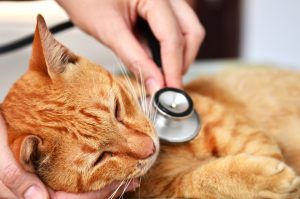 Red Bank Veterinary Hospital has seen a recent increase in cats being accidentally poisoned by rodenticide. Medical diagnostics for these cats show damage to their nervous systems which is consistent with the reported effects of a type of rodenticide containing bromethalin. What makes this over-the-counter rodenticide even more dangerous is that there is no antidote, meaning there is no specific treatment designed to counteract the effects of the poison once it begins to affect the body.
Red Bank Veterinary Hospital has seen a recent increase in cats being accidentally poisoned by rodenticide. Medical diagnostics for these cats show damage to their nervous systems which is consistent with the reported effects of a type of rodenticide containing bromethalin. What makes this over-the-counter rodenticide even more dangerous is that there is no antidote, meaning there is no specific treatment designed to counteract the effects of the poison once it begins to affect the body.
Bromethalin-poisoned cats develop rapidly deteriorating neurologic symptoms and unfortunately, once these symptoms develop, most cats do not survive. These symptoms include:
Bromethalin is a poison that causes fluid to abnormally accumulate in the brain and spinal cord, causing severe swelling of these tissues. This swelling results in the neurologic symptoms described above. The best diagnostic imaging test to detect this swelling is MRI.
While there is no antidote for bromethalin poisoning, there is a very short period of time to try to block the toxin from being absorbed by the body after it is eaten so time is of the essence to seek medical attention.
The best prevention is to not use rodenticides in and around your home, especially those containing bromethalin, and to keep outdoor cats under strict supervision if they are prone to hunting. Cats can be exposed to the poison by eating it directly or by eating mice or rats who have already ingested the toxin. These mice or rats cannot move normally after toxin ingestion, making them easy prey for inquisitive cats. While cats are the most sensitive, dogs can also be affected by bromethalin. In both cats and dogs, only small amounts of bromethalin are required to cause toxicity leading to death.
Please be aware that all rodenticides, including those using active ingredients other than bromethalin, are toxic to animals. Up until now, there have been treatment options for pets exposed to previous generations of rodenticide ingredients. However, this newer generation of rodenticide containing bromethalin is especially dangerous because there is no antidote.
If you think your pet may have been exposed to rodenticides of any kind, it is critical to do the following:
Curious pets have been known to get into things they shouldn't. Be sure to pet proof your home as much as possible to avoid inadvertent toxin exposure. In general, if you think your pet has ingested any hazardous substances, including home and garden products, human food and medications, poisonous plants, or other harmful objects, please contact your veterinarian, your local veterinary emergency hospital, or the ASPCA’s 24-hour emergency poison hotline at 1-888-426-4435. Keep these phone numbers in a convenient, easy to find place at home. For a comprehensive list of hazards and toxins, visit www.aspca.org.